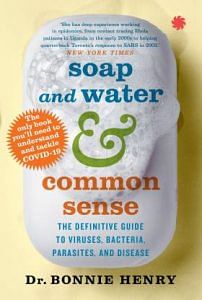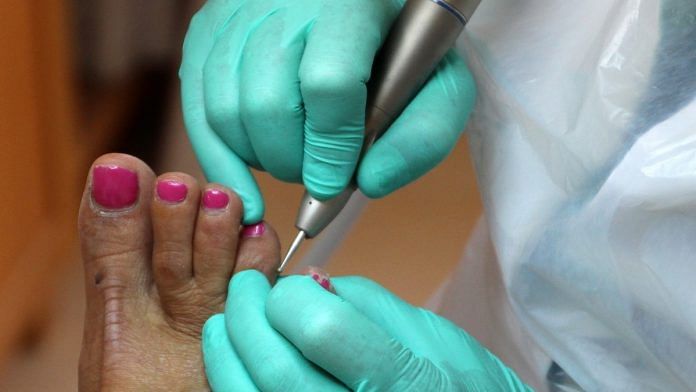Another warm water environment that provides perfect conditions for some of the bugs at Microbes Inc. are what are known as personal service settings: nail salons, hairdressers, barbershops, spas, acupuncturists, and body piercing and tattoo parlours. Traditionally these services have not been of great concern to public health officials. However, recent inspections of nail salons and spas, triggered by the outbreak in California in 2000, have revealed that pedicures are far from the only infectious risk posed by these settings. With reuse of unsterilized equipment to cut nails or shave calluses, unclean hand and footbaths, and contaminated wax, the plucking, trimming, and painting that goes on in salons has created an ideal environment for many bugs to thrive.
In San Jose, California, 140 men and women became infected with Mycobacterium chelonae (a microbial cousin to M. fortuitum) after receiving pedicures in thirty-four different salons in 2004, and similar outbreaks have been recorded in Illinois, Colorado, Washington State, and Oregon. In 2007 a woman in California, who was undergoing cancer treatment, developed an infection caused by an antibiotic-resistant strain of Staphylococcus after being given a pedicure, and she died as a result. In Toronto, more than thirty women developed terrible abscesses on their legs, arms, and bodies after receiving acupuncture from needles contaminated with another nasty bug, Mycobacterium abscessus. Licensing bodies in many U.S. states and provinces of Canada have now developed standards for cleanliness and disinfection at nail salons, spas, and other personal service settings to reduce the risk of infections. But in a high-volume business these regulations may not be followed as strictly as they should be.
Tattoo and body piercing parlours have also been linked with infections, though for many years these practices were well out of the mainstream, so little attention was paid to these services. In the 1960s tattooing moved beyond the realm of sailors and convicts, and body piercing became trendy in the 1970s after a piercer in California published a magazine called Body Art. While facial piercings have long been traditional to many cultures, other body piercings, particularly of the nipples and genitals, are largely a new, Western phenomenon that became popular through the myths propagated by Body Art. One of the magazine’s most infamous stories suggested that Prince Albert, Queen Victoria’s husband and great love, wore a penis ring to avoid unsightly bulges; this story gave birth to a piercing called the “Prince Albert,” which enjoyed incredible popularity. Despite its persistence in urban mythology this is undoubtedly an invented story.
Also read: Eyebrow threading device, kaadha instead of tea: Mumbai’s beauty salons reopen with tweaks
Some of the more serious infections that have been linked to tattooing and body piercings are hepatitis B and C. These viruses cause inflammation of the liver and can lead to liver failure, liver cancer, and sometimes even death. Hepatitis B and C are passed from person to person through exchange of contaminated body fluid such as blood, tears, or saliva; hepatitis B can also be transmitted through sexual contact. Over the past decades, tattooing with unclean needles or contaminated ink pots has caused hundreds of people to develop these lifelong infections. Only a minuscule amount of contaminated blood is needed to transmit the infection, but despite the fact that this knowledge has been around for decades, outbreaks continue to be reported. In 2004 a group of people in Toronto contracted hepatitis B after getting tattoos from a temporary stall at a Saturday flea market.
Tattooing and body piercing have also been the cause of other, less lethal but serious infections such as herpes, MRSA, tuberculosis skin infections, fungal infections of the bone, and infections from a virus that causes warts. There have even been rare but concerning reports of infections from dirty tattoo needles that caused blood poisoning, infections of the heart, and even death.
Outbreaks of disease in our neighbourhoods remind us that the divisions of Microbes Inc. are all around us, and we must take the necessary precautions to ensure we are best protected. First, get services only from places that look clean and have a licence. Unlicensed businesses may not follow hygiene regulations, and temporary shops and stalls are unlikely to have adequate facilities to ensure that proper sanitation is maintained.
If you are going for a pedicure, check that the footbaths can be emptied easily and are cleaned between each use. Avoid whirlpool baths, which simply recirculate water and are much more difficult to clean. Ensure that your technician uses sterile equipment when he or she is trimming your nails, and avoid having calluses removed with a razor— a file is much safer. Don’t shave or wax your legs twenty-four hours before a pedicure or, if you are having both services done at the same time, ask for the pedicure first.
Also read: Where to worry about catching Covid-19, and where not to
If you have a medical condition such as diabetes or a weakened immune system, you need to be extra careful about making sure you don’t have any scrapes or cuts before going in for one of these services, and that all of the equipment being used is sterile. In fact, it may be better to avoid nail salons altogether. And of course make sure the staff clean their hands regularly (either with alcohol-based hand rubs or soap and water) and especially between each client they work on. And don’t be shy about asking the staff about their environmental sanitation procedures; if they don’t want to talk about it, you should think about going somewhere else.
If you have a medical condition such as diabetes or a weakened immune system, you need to be extra careful about making sure you don’t have any scrapes or cuts before going in for one of these services, and that all of the equipment being used is sterile. In fact, it may be better to avoid nail salons altogether. And of course make sure the staff clean their hands regularly (either with alcohol-based hand rubs or soap and water) and especially between each client they work on. And don’t be shy about asking the staff about their environmental sanitation procedures; if they don’t want to talk about it, you should think about going somewhere else.
 This excerpt from Soap and Water Common Sense — The Definitive Guide to Viruses, Bacteria, Parasites, and Disease by Dr Bonnie Henry has been published with permission from Juggernaut.
This excerpt from Soap and Water Common Sense — The Definitive Guide to Viruses, Bacteria, Parasites, and Disease by Dr Bonnie Henry has been published with permission from Juggernaut.




As a professional body piercer at a reputable piercing studio, who also holds a bachelors of science, I would love the citations on professional body piercing being linked to the various diseases described in this article. Give me sources.
Also a tattoo from a flea market is nowhere near the same as receiving a body piercing in a sterile setting from a professional who is educated in blood borne pathogens and preventing cross contamination.
What an utterly irresponsible article.
Please update this article with current trends and literature. Great general info for the public to look out for but relate this information to what’s plaguing now.
Hard to take this article seriously with all the poor editing.
I believe high standards sanitazion practice should be performed at all times, not only during the pandemic Covid -19, ,It should be our main responsibility, as a salon spa owner I encourage everyone to follow these simple rules, for years we have been recognized for our hygiene and sanitation practice, and all our clients are greatful for that. Showing them we care for our health and theirs is the most important. Thanks